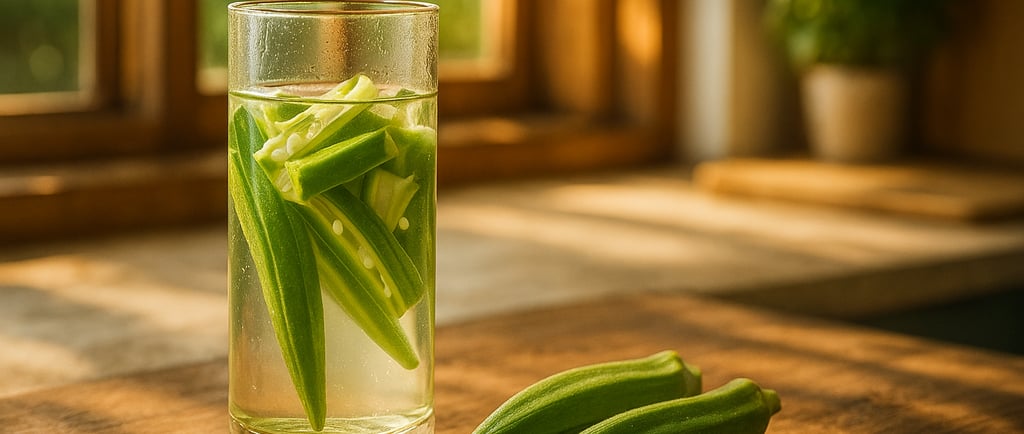Okra Water Benefits and Side Effects – What Studies Say
Discover the real benefits and side effects of drinking okra water, backed by research. Learn how it may aid blood sugar control, digestion, and heart health—plus important risks to know.
HEALTHLANDING PAGE


Every few months, a new “miracle drink” storms through TikTok, Instagram, and Pinterest like a tidal wave—promising weight loss, glowing skin, stable blood sugar, and a brand-new life. Most disappear as fast as they show up. Is the same going to happen with okra water? Time will tell.
Searches for “okra water benefits” have surged by over 470% on Pinterest in the last year, with TikTok creators racking up millions of views sharing their results. Some say it’s helped them regulate blood sugar. Others claim better digestion, weight loss, or even improved fertility.
That’s where I come in—digging through peer-reviewed studies, nutritionist interviews, and actual medical opinions to separate science from sales pitch. This isn’t a fan-girl rave about okra water, nor a cynical takedown. It’s the raw truth: the real benefits, the risks, and what studies actually say.
What is Okra Water and Why is It Trending?
Okra water is made by soaking whole okra pods—fresh or sliced—in water for 8–24 hours. The soaking releases a viscous, slightly slimy substance called mucilage, rich in soluble fiber. That’s what gives okra water its “thick” texture.
The trend didn’t start in a lab—it started in West African, Middle Eastern, and South Asian kitchens, where okra is a long-loved ingredient in soups and stews. But what pushed it into the viral spotlight is its packaging as a “wellness drink” for blood sugar, digestion, and weight loss.
Pinterest called it a top fall wellness trend in 2024. TikTok took it further, adding claims about fertility and skin health. But social media trends are like gossip—they grow bigger with every retelling.
So, let’s strip it back to what’s proven, what’s promising, and what’s pure hype.
What Studies Say About Okra Water
Blood Sugar Regulation
This is the claim with the strongest early evidence—but it’s still in the “promising” category, not “proven.”
A 2011 animal study in the Journal of Pharmacy & BioAllied Sciences found that okra peel and seed extracts reduced blood glucose levels in diabetic rats.
One human trial conducted in the Philippines examined whether okra seed–peel powder, when consumed along with a glucose load, could modulate blood sugar levels over a 3-hour period. While the exact context of sucrose/glucose spikes isn't identical to "daily meal glucose spikes".
The catch? Almost all studies used whole okra or powdered okra—not water. We don’t know exactly how much mucilage-infused water retains the effect.
Weight Management Potential
Fiber plays a quiet but powerful role in weight control. It increases satiety—meaning you feel full longer—which can naturally reduce calorie intake.
A 2020 review in Nutrients summarized human randomized trials showing that soluble fibers such as inulin, β-glucan, and galacto-oligosaccharides (GOS) improve gut microbiota diversity and are associated with reduced inflammation and better metabolic health.
Again, okra water contains less fiber than the vegetable itself. It’s not a fat-melting drink, but it can be part of a low-calorie, high-fiber plan.
Claims That Aren’t Fully Proven
Some viral posts claim okra water can:
Improve fertility
Boost energy
“Detox” the body
The reality: There’s no peer-reviewed research confirming these. While nutrients in okra—like folate and vitamin C—are important for reproductive and overall health, okra water alone isn’t a magic fertility potion.
Possible Side Effects of Okra Water
Even natural remedies can cause problems.
Digestive Discomfort – Bloating, gas, or loose stools can occur, especially if your gut isn’t used to extra fiber.
Kidney Stone Risk – Okra contains oxalates, which may contribute to calcium oxalate kidney stones in sensitive individuals (UCI Kidney Stone Center oxalate list).
Blood Clotting Interference – Okra contains vitamin K, which can interfere with blood-thinning medications like warfarin.
Blood Sugar Drops – If you’re diabetic and on medication, combining okra water with your meds could cause hypoglycemia—so check with your doctor.
How to Make Okra Water (Safely)
Ingredients:
3–4 fresh okra pods
1 glass (250 ml) of water
Method:
Wash the okra thoroughly.
Slice off the tips and cut each pod in half.
Place in a glass jar and cover with water.
Let soak for 8–24 hours at room temperature.
Remove pods and drink the infused water.
Tips:
Start with small amounts (½ glass) to see how your body reacts.
Store in the fridge if soaking longer than 8 hours.
Use fresh pods—avoid bruised or moldy ones.
Okra Water vs. Eating Whole Okra
Whole okra gives you more fiber, vitamin C, magnesium, and antioxidants than okra water.
Okra water is easier for people who dislike the texture of cooked okra.
Think of okra water as a supplement, not a replacement for a healthy diet.
Final Thought
Okra water is not a scam—but it’s not a cure-all either.
If you expect to drink it for a week and “reset” your body, you’ll be disappointed. But if you see it as one small, low-cost habit alongside a balanced diet, regular movement, and adequate sleep, you might notice benefits—especially for digestion and blood sugar steadiness.
Here’s the bottom line:
Worth trying? Yes, if you’re curious and healthy.
Safe for everyone? No—especially not for people with kidney stone history, certain clotting disorders, or uncontrolled diabetes without doctor supervision.
FAQs
Q: Can I drink okra water every day?
A: If you tolerate it well, yes—but monitor for digestive discomfort.
Q: Does okra water help with diabetes?
A: Some research suggests it may help regulate blood sugar, but more studies are needed. Never replace your prescribed treatment.
Q: Can okra water help me lose weight fast?
A: No drink will melt fat overnight. It may help you feel full, which can support weight management.
Q: Is it safe during pregnancy?
A: Okra is generally safe, but okra water’s concentrated form hasn’t been studied specifically for pregnancy—check with your healthcare provider.